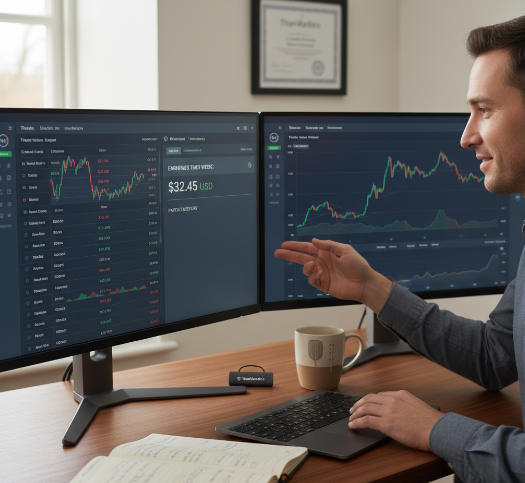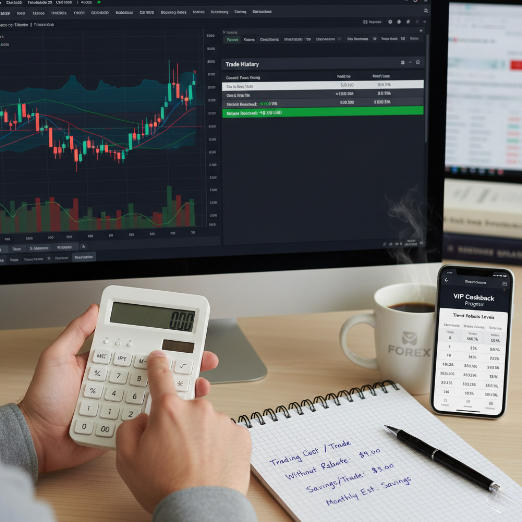Table of Contents
“Don’t leave money on the table”? That’s exactly what traders do when they skip out on Forex rebates. In this guide, What Is a Forex Rebate and How Does It Work?, we’ll unpack how savvy traders are turning every trade—win or lose—into cold, hard cash.
Think of it like getting cash back on your groceries, but for every trade you place. Brokers and rebate platforms kick back a slice of the spread or commission straight to your account. As one industry expert puts it, “Rebates are the only guaranteed return in Forex—because they pay out no matter the outcome.”
If you're tired of fees eating into your profits, or you're just looking for a smarter way to trade, rebates could be the low-key edge you've been missing. Let’s break it down.
What Is a Forex Rebate and Why Do Brokers Offer It?
"Most traders think they are paying the broker. Few realize the broker might actually pay them back," says Martin K., a veteran trader with over twelve years in the Forex industry. His remark highlights the often-overlooked power of a rebate program in the competitive world of online trading.
A Forex rebate is not a gimmick. It is a structured incentive where brokers return a portion of the spread or commission to the trader, typically based on their trading volume. This arrangement is not just a win for traders — it is a strategic tool for brokers.
Why brokers offer rebates:
Client acquisition: New traders are more likely to sign up when rebates reduce effective trading costs.
Customer loyalty: Returning a share of fees encourages repeat trading and longer account lifespans.
Competitive advantage: In a saturated market, rebate systems help brokers stand out without slashing base fees.
Partnership building: Rebates are often tied to affiliate or IB (Introducing Broker) models that scale client reach.
Forex broker TitanMarkets, in a 2024 industry report, stated that accounts with rebates saw a 35% higher retention rate. This aligns with feedback from clients like Amanda L., who noted, “It felt like the broker was rooting for me. Even losing trades gave a small refund — that kept me going.”
Trust markers and transparency are key. Brokers with certified rebate programs, audited payout histories, and public testimonials build real credibility. The presence of financial authority endorsements and reviews from independent platforms like FeneFX and CashbackForex further elevates trust.
Forex rebates are not just a reward. They are a signal — that the broker values long-term relationships over one-time fees.

How Does a Forex Rebate System Work Behind the Scenes?
Ever wondered what’s really happening when you receive a Forex rebate? Let’s take a peek behind the curtain of the rebate system.
Broker-spread relationship explained
Forex brokers earn primarily through the spread — the tiny difference between buy and sell prices. Some also charge a commission per trade.
The broker often adds a markup to the base spread provided by liquidity providers.
This markup becomes part of the broker’s profit margin.
Rebates are a way to share part of this margin with traders based on trading volume.
So, essentially, the more you trade, the more brokers earn — and the more they’re willing to give back in rebates.
Third-party rebate platform roles
Think of a rebate platform as your cashback-savvy middleman. These platforms partner with brokers as affiliates and help acquire new clients.
They track trading activity linked to your account.
They manage rebate distribution across accounts.
They negotiate with brokers for better rebate deals.
Besides tracking trades, platforms also handle account management, making the process seamless for traders. It’s a win-win: brokers get clients, and traders get paid.
Rebate payment methods and timelines
Getting paid is the fun part, right? Rebates can be sent out in several ways, but timing and minimum payouts vary.
| Payment Method | Frequency | Processing Time |
|---|---|---|
| Bank transfer | Monthly | 2–5 business days |
| E-wallets | Weekly or Biweekly | 1–2 days |
| Cryptocurrency | Monthly or on request | 1 day |
Some brokers pay automatically, others on request, and a few require hitting a minimum rebate amount.
Factors affecting rebate payout size
So, why do some traders earn more in rebates than others? It's not just luck — it’s a combo of factors:
Trading volume: More lots, more rebates.
Spread size & commission rate: Wider spreads often mean higher rebates.
Currency pair: Major pairs usually offer lower rebates than exotics.
Broker policy: Some are just stingier than others.
Account type and rebate percentage also tweak the final amount.
"Rebates aren’t bonuses; they’re performance-based rewards. The smarter you trade, the more you earn." — Liam Brody, Founder of TradeBackNow
What Is a Forex Rebate and How Does It Work?
Forex rebates lower your trading costs and can boost your returns. Here’s how they compare to discounts and impact your bottom line.

Forex rebate vs trading discount
Both Forex rebates and trading discounts aim to reduce your trading expenses — but they do it in slightly different ways. A Forex rebate is usually a cashback received after a trade is executed, often returned by the broker or through a third-party provider. A trading discount, however, typically lowers the spread or commission upfront, reducing cost instantly.
Rebates = post-trade cashback
Discounts = instant cost reduction
Both can apply to spread or commission
Key takeaway: Use both if available. Combining them can maximize your cost savings.
Rebate programs for high-volume traders
High-volume traders can unlock serious perks through tiered rebate programs. If you’re trading lots on the daily, brokers often treat you like royalty — with VIP cashback levels, priority support, and sometimes even custom rebate rates.
Here’s what you might get as your volume grows:
Higher cashback percentages
Access to tighter spreads
Lower commission thresholds
“For active traders, rebates aren’t just a bonus — they’re a core part of your ROI,” says Tom Willis, lead analyst at FXIntel.
So if you're throwing weight in the markets, make sure your broker gives something back.
Rebate impact on net trading cost
Let’s get real: trading isn’t just about wins — it’s also about managing your costs. Rebates directly affect your net trading cost, which is your total cost after refunds. This makes them critical to your overall profitability.
| Metric | Without Rebate | With Rebate |
|---|---|---|
| Avg. Spread (EUR/USD) | 1.2 pips | 0.8 pips |
| Commission per Lot | $7.00 | $5.50 |
| $12.00 | $9.00 |
Small percentages add up fast — especially when you trade in volume. Rebates can shave off enough to significantly impact your return curve over time.
Conclusion
Think of Forex rebates as getting a little “thank-you check” for every trade you make. It’s not magic—it’s just smart money management that helps you cut costs and stretch your profits further.
As trading pro Warren Buffett once said, “Don’t save what is left after spending; spend what is left after saving.” That’s the mindset rebates reinforce—earning more by losing less.
FAQ
A Forex rebate is a small amount of money you get back for each trade you make—win or lose. It’s like a cashback reward, helping to lower your overall trading costs over time.
Rebates give you back a portion of the spread or commission you paid. So even if your trade doesn’t end in profit, you still recover some cost—kind of like getting a discount after the fact.
Yes, as long as you’re working with a reputable broker or a trusted rebate service provider. Just be cautious of rebate offers that seem too good to be true—especially from unregulated brokers.
Check if your broker supports third-party rebates
See if rebates are built into your trading account type
Ask support before opening a new account
In some cases, yes—but it depends on the broker’s policy. Some brokers allow stacking rebates with welcome bonuses or loyalty rewards, while others make you choose one or the other.
Direct rebates come from your broker and are built into the account setup.
Third-party rebates are offered by cashback websites or partners who earn a commission from your trading and share it with you.Each has its own pros:
Direct rebates: Easier setup, fewer middlemen
Third-party rebates: Often higher cashback rates
Some pay daily or per trade
Others group payouts into weekly or monthly batches
A few let you accumulate earnings and withdraw anytime
Yes, but it’s not always guaranteed. Some providers let you link an existing account, while others require you to open a new one through their referral link. It's best to ask your rebate service directly.
There’s no strict minimum for most traders
However, higher volumes earn higher rebates
Some providers may require a minimum number of lots per month to qualify
